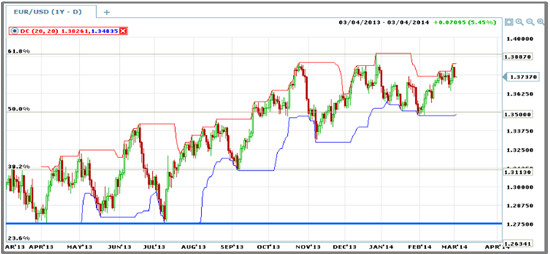Binary Options Donchian Channel Indicator – Surfing To Profits
Full Review of the Donchian Channel Indicator for Binary Options
Donchian Channels are a trend following indicator developed by Richard Donchian. The channels are based on the highest high and lowest low, providing signals in a similar fashion to Moving Average Envelopes and Deviation Bands. Find out just how useful they can be for binary options trading.
Channels are a well known method of analyzing financial charts. There are many kinds of channels based on a wide variety of methods including moving averages, standard deviations and other more esoteric means. Donchian Channels are a relatively simple method of channel analysis created by Richard Donchian. They are most widely used for trend following signals but also have other uses. The main signals given are trend following, my favorite kind. After only a brief foray into the world of Donchian Channel trading I have determined that this is an indicator I like and one that can be adapted to binary trading with ease.
What Is A Donchian Channel?
A Donchian Channel is a channel formed by the highest high and the lowest low of the past N periods. The standard setting is 20/20, that means the highest high of the past 20 periods and the lowest low of the past 20 periods. The indicator is widely available and comes with most chart packages. In effect it is simply a “high/low” channel. The objective of the indicator and the strategy is to ride the trend on a break out. For that reason, and because of how the indicator displays, it works the best in a trending market. It works less well in a range bound market because the best signals the indicator gives is a channel break out.

This is how the signal works. The channels are drawn for the highest high and the lowest low the past N periods. When prices break out of the channel in the direction of the underlying trend you enter trend following positions. For example if the asset is trending up and the price action breaks the upper channel line then you would enter calls with an appropriate expiration time. If the asset were trending lower then you would look for a break of the lower channel marker. Because the indicator was first intended for futures, commodities and spot type positions it also comes with an exit signal which would be the opposite of the entry. For binary trading the exit is not as important except that it might be an indication of possible reversal.
Why This Indicator Might Suck
This indicator might suck because no indicator is fool proof. It also might suck depending on which time frame you use. Longer term time frames will have stronger signals but much less of them. Shorter time frames will have weaker signals but much much more of them. Also, it can be hard to determine what a break is sometimes because each time that a new high is set the channel widens.
Why This Indicator Might Not Suck
This indicator might not suck because it is based on a couple of sound technical principals. For one it is trend following. Trend following techniques, signals and strategy are the best in my opinion. It is also based on a break out. Break outs to new highs and lows are great indicators of market intent, especially when they are in line with underlying trends.
My Last Words On Donchian Channels: Keep Discussing on Forum
I like this indicator. It is a good use of channel theory and comes with the addition of a break to new highs or lows. As a channel indicator it is easy to implement and to understand which is, I think, a good way to understand how and why your trades are or are not working. Additionally, it is only intended for trend following entries so there is no confusion of whether the signal you are seeking is confirming or contrarian, a problem some other less specific indicators can cause. I recommend this indicator for newbies and pros alike and look forward to seeing some good discussion about it on the forum.